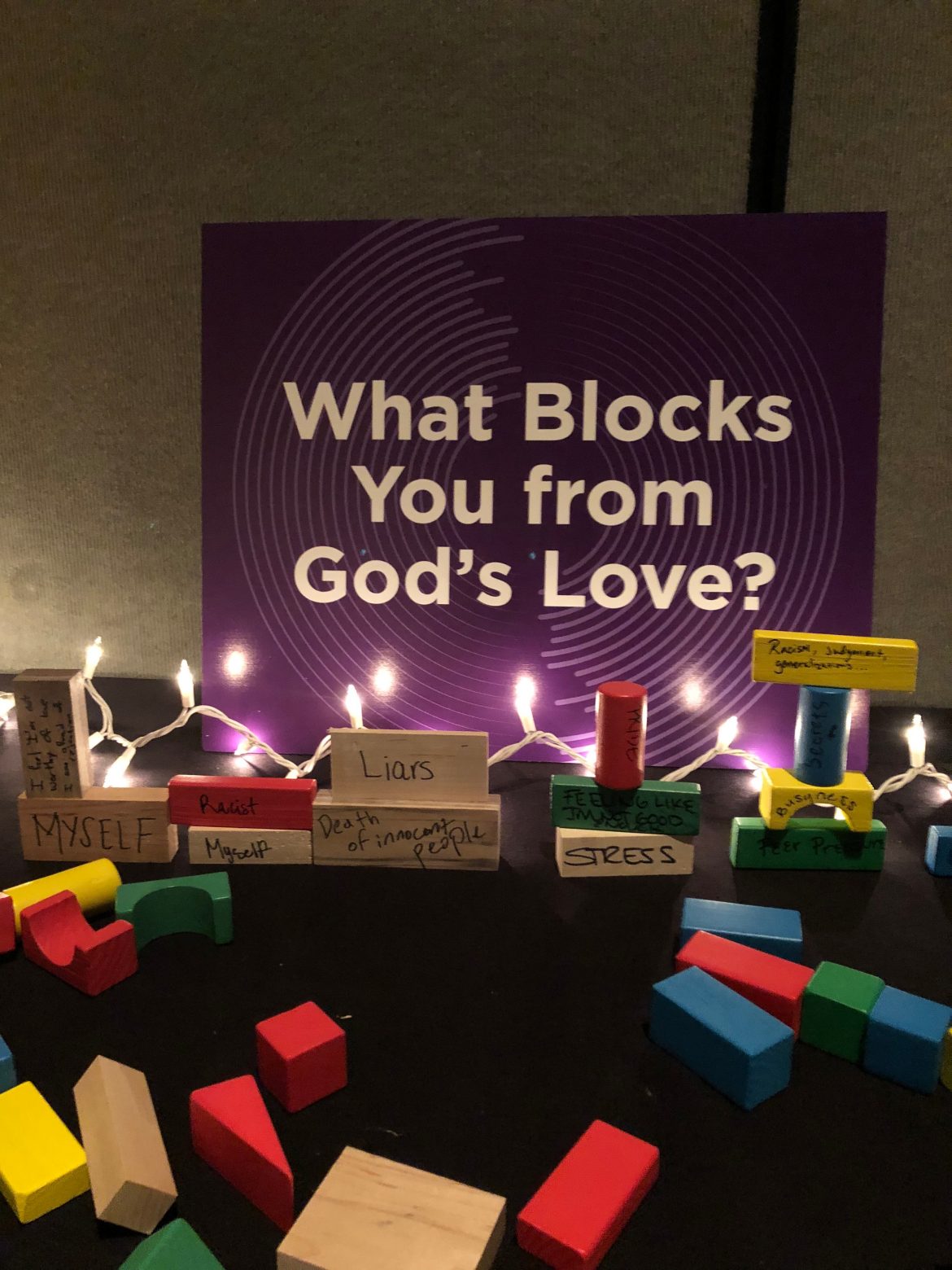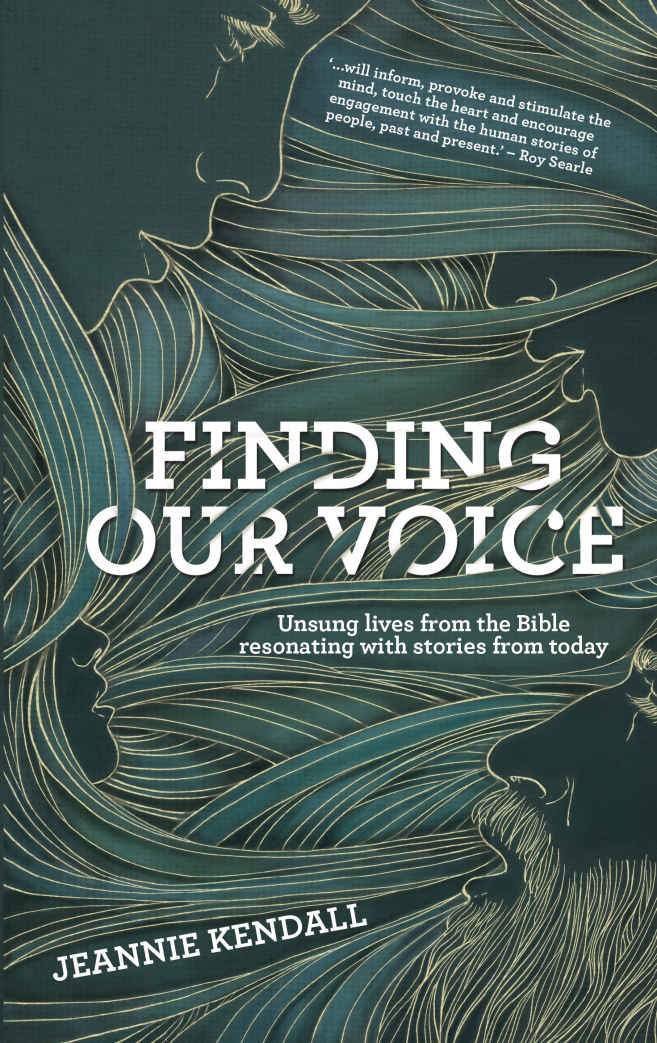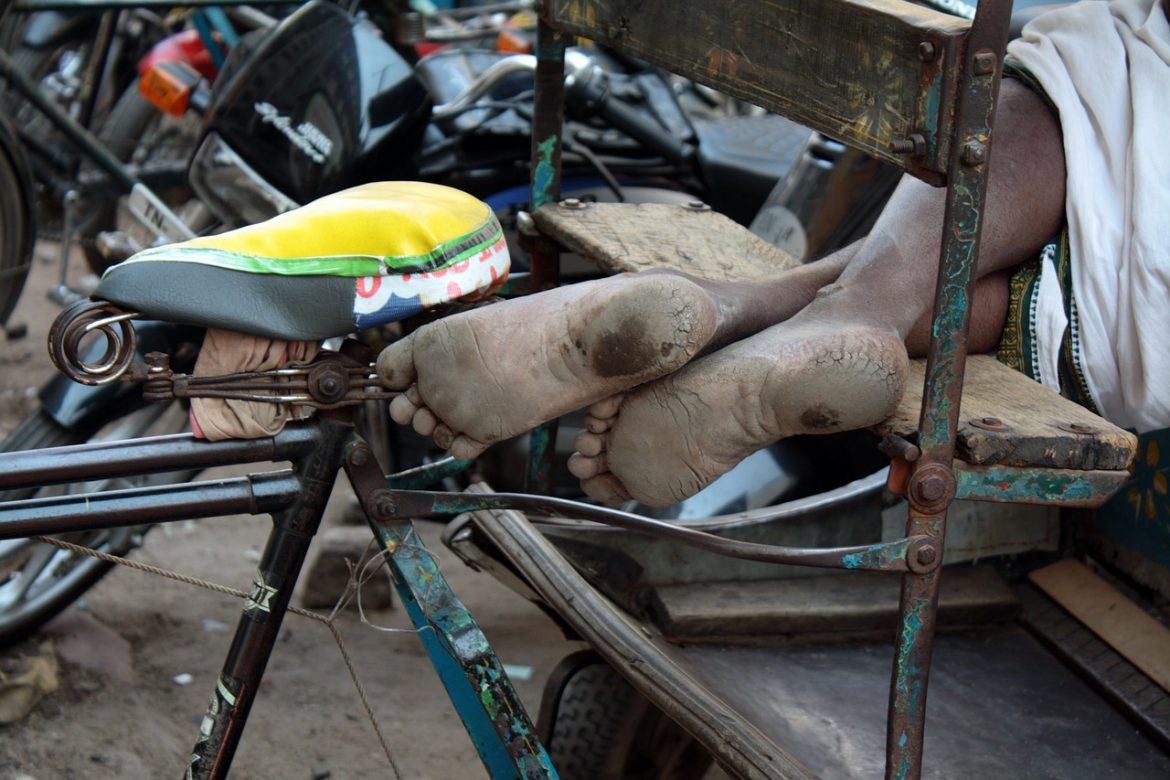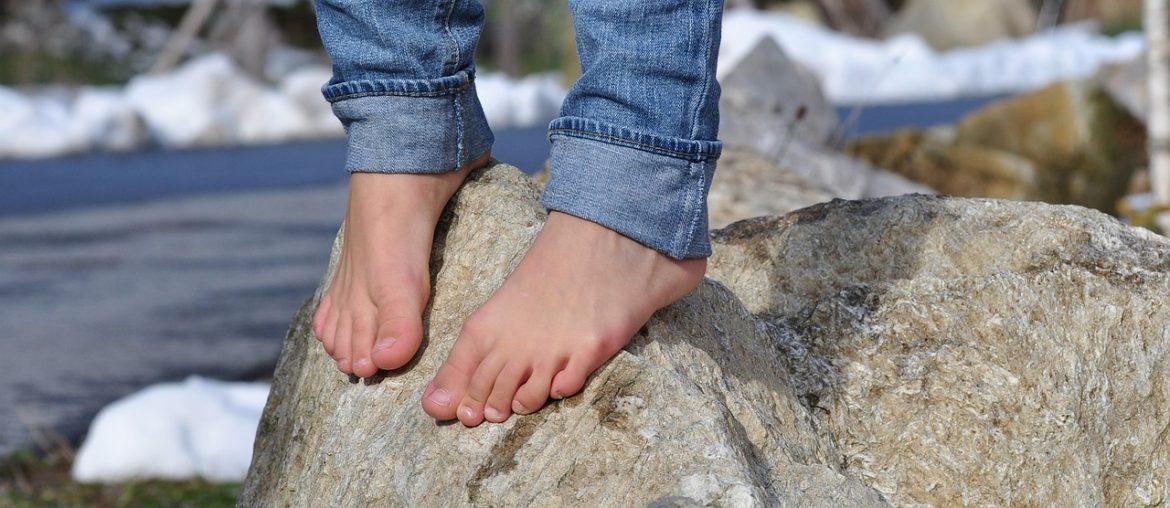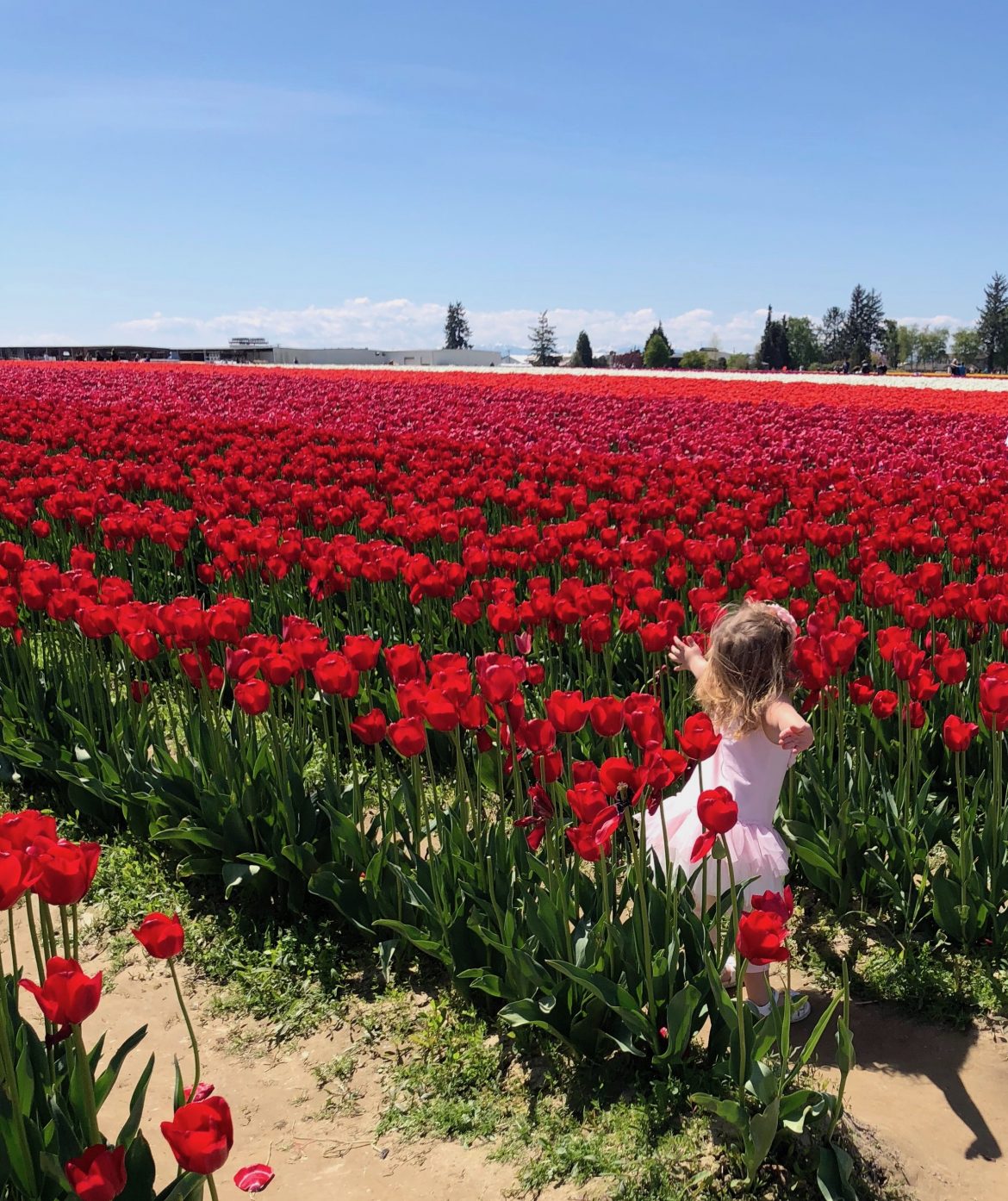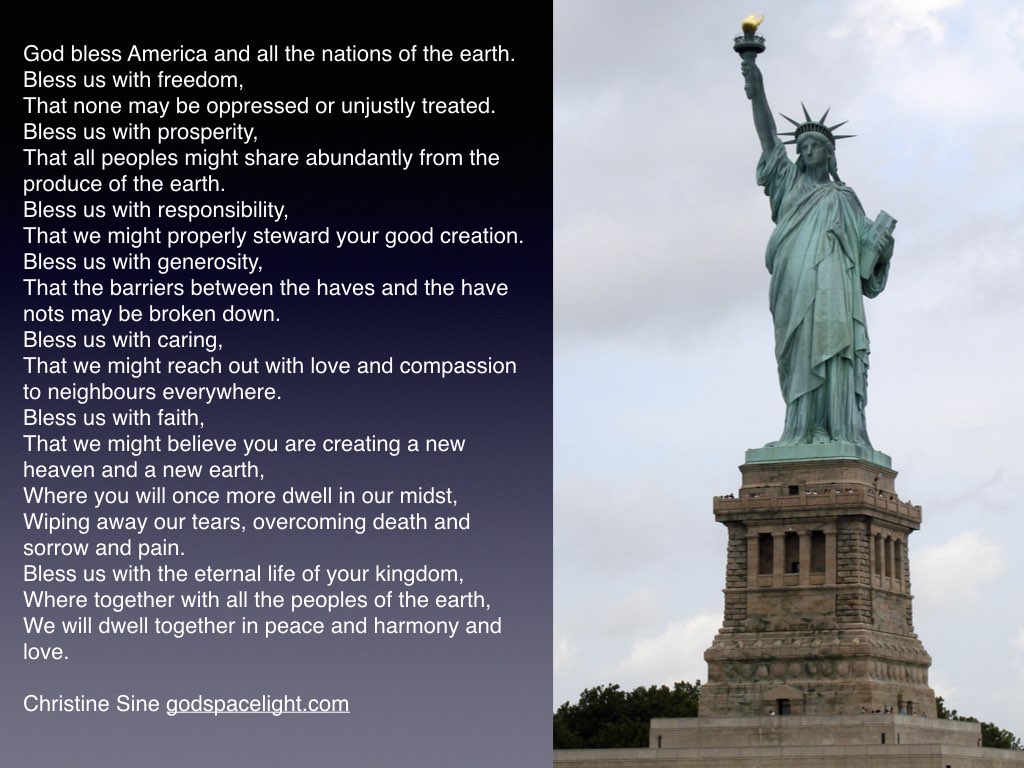I’m in Kansas City this week, curating a Sacred Space Prayer Room experience for the United Methodist Church YOUTH2019 Conference. It’s a gathering of students and leaders from all over the United States and beyond. The Upper Room is sponsoring the Sacred Space and hired me to design and curate the space around the theme of the event, LOVE WELL. 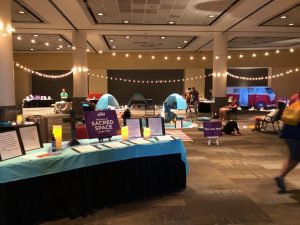
How do we LOVE WELL? How do we LOVE GOD, LOVE OURSELVES, and LOVE OTHERS WELL?
First, I believe that we cannot love well if we don’t have margin in our lives, if we don’t have rest! So I designed the entire Sacred Space around the LOVE WELL fountain where participants can sit down in rocking chairs, lay down on blankets, or sit on a cushion and JUST REST and BE with Jesus. 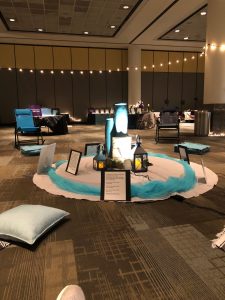
I then added small prayer tents, called Poustinias, so students could pray and listen to God or just take a nap in them.
“Poustinia is a Russian word for a small sparsely furnished cabin or room where one goes to pray and fast alone in the presence of God. The word poustinia has its origin in the Russian word for desert. 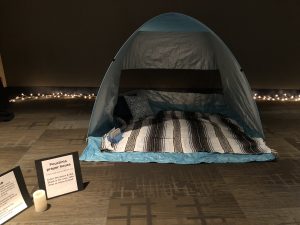
Whenever I design a Sacred Space Prayer Room or Prayer Experience, I start with four prayer stations.
1. A Place to Pray for the World, because God blesses the World not just America.
2. A Place to Confess our Sins, because we Protestants are bad at that!
3. A Place to Create Prayers in Art, because that’s how I like to pray and because I want the artists to know that their creativity is prayer.
4. A Place to Rest, because it’s a commandment! and #RESTisHOLY
After creating the design for these four stations, I then build on the theme and/or the Scripture passages being taught at the conference. 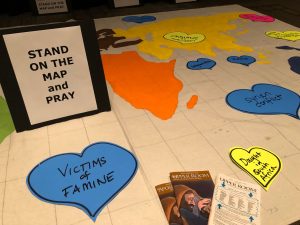
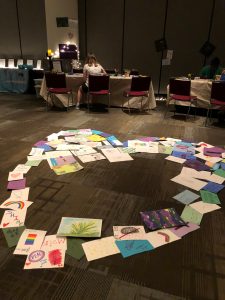
In this Sacred Space we are standing on a hand painted map of the world and praying for different places, countries, and people to be filled with the love of God. I also created some large tag board hearts that people can pick up to pray with as they stand on the map. The art station has two tables filled with supplies to create with and one of my team created a heart outline on the floor that the students are filling in with their art prayers. I created a new confession station for this Sacred Space and it involves building blocks. I like to use everyday items that you will see again to help people remember their experience with God. I also knew that their would be lots of guys at this event and I wanted something fun and tactile to engage them right when you walked in the space. This may be my new favorite station! Participants are writing down with sharpie markers, the things that BLOCK them form receiving God’s Love. They are writing this on the Building Blocks and giving these to God to hold. Letting them go and receiving God’s love!
So what are the things that are BLOCKING you from receiving God’s love today? Talk to God about this. If you have some wooden blocks actually write these things down so you have a visual of them to give to God to remove for you! Here is the signage/directions from this station: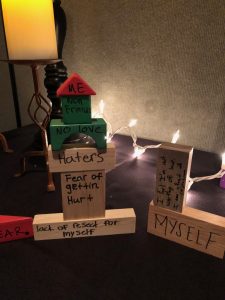
What Blocks you from God’s Love?
To love well we all
need to receive the
love of God.
What stops you from believing in the Goodness of God? What things block you from believing in God’s love for you?
Write these on a block and give them to Jesus to hold for you.
ACTION:
WHAT BLOCKS
YOU FROM GOD’S
LOVE?
Write these things on a block and give them to Jesus to hold for you.
Allow Jesus to unblock these things.
Allow Jesus to hold all the stuff, the junk, the sin that blocks you from receiving his great love for you! Remember that Jesus loves you, RIGHT NOW, JUST AS YOU ARE! You don’t have to get your act together first. Allow Jesus to love you now, so you can love others well.
Take time this week to practice the four areas I’ve talked about above.
and most importantly, REST. Really. Just REST. Take a Nap. Take time to Stop, Be, Breathe and let God love you well.
Sacred Space prayer kits can be purchased in the store at freerangeworship.com There is a great on for Back to School that has stations based on School Supplies if you are thinking ahead.
©lillylewin and freerangeworship.com
I love the sound of Jeannie Kendall’s latest book and think that you will too.
- Tell me a bit about yourself and your life journey.
I grew up in Cornwall, a beautiful but rugged county in the south-west of England. Being surrounded by beautiful countryside had a profound influence on me. My growing up years were not always easy though. We lived in a remote hospital (remote as originally it was for TB patients) as my father was a doctor there so I was surrounded by people who were ill or dying. Then when I was 12 my father died after a long illness and so we lost our housing and had to move into a nearby town.
When 16 I started attending a local church, mainly to be disruptive. However I became a Christian and my life changed – and is still changing. My journeying has always included questioning, and enjoying a wide variety of worship styles.
I am married, with two grown up children and two grandchildren, currently aged 9 and 4. My husband, children and grandchildren teach me more than anything else.
All my life I have loved stories, whether reading them, or hearing them from all the people it has been my privilege to listen to in my various roles.
- Tell me a bit about your book – In a nutshell what is the main theme?
Finding Our Voice looks at eleven of the unnamed men and women of the Bible, telling their stories imaginatively (as if them), then with the text, a little context and explanation, but then, importantly, a story from people living now, also not named, who have faced the same challenges. Finding Our Voice examines important themes, including being a refugee, finding forgiveness, looking for love, abuse, death and hope. Some of the stories are brave and gritty.
- What inspired you to write the book?
For a long time I had been writing poetry on the unnamed women of the Bible, and thinking imaginatively about their stories. However the full idea literally came to me on a clifftop watching birds! Incredibly, at the same time my husband, who was also quietly been bird watching, felt God told him that I should write a book in my upcoming sabbatical. The other inspiration has been all the many stories it has been my privilege to hear and be a part of, which are not directly in the book but have made me the person I am today.
- What is the main “take away” that readers will gain from your book? How do you hope they will be changed?
Both that the Bible is incredibly relevant and also that their own stories are important and known to God. I hope that their understanding of the Bible will be enhanced, or refreshed by looking at some of the stories again, or even that they will look at the Bible for the first time, as I hope the book might be gifted by Christians to people who would not normally read the Bible or do church but love stories and find people fascinating.
- Writing a book often changes our own perspectives. How have you been changed by writing this book and what do you continue to learn about the topic?
Well I’ve learnt a whole lot about publishing, a new world for me! I think the way Finding Our Voice came about – more than I can include here – has been a reminder of God’s grace and the way he works quietly through us in so many different ways. I have been humbled by the bravery of the people who shared their stories for the book, and also by the response to it so far.. I am continuing to reflect on these and other stories and I am sure always will.
- Where can readers connect to you on the internet and what is the best way for them to purchase your book?
My website – www.jeanniekendall.co.uk is a good way to make contact, though I am also on Facebook, including a specific page for the book – search Finding Our Voice. In the UK books can be bought via the website, postage free. In the States they are available through Amazon – and possibly other sources too. Authentic Media are the publishers.

Jeannie Kendall
Jeannie Kendall grew up in Cornwall, moving to London at 18 to train as a teacher. She taught in two secondary schools, both Religious Education and English and Drama. From there she went to work for the church she attended, (and was involved in running a dance and drama group) initially in their bookshop (great for a reader like her!), then setting up and running a coffee shop, and then setting up and for some years running an award-winning counselling service in the community. In time she returned to working directly in the church context as a pastoral worker and trainer, subsequently training for ministry and becoming ordained. In 2011 I moved to the church I currently serve in, Carshalton Beeches Baptist Church.
She is married with two grown up children and two grandchildren. She enjoys gardening, reading and theme park rides.
By Barbie Perks —
African time is a very real thing! In South Africa, when people were often late for appointments, I used to put it down to transport difficulties and didn’t give it much thought further. However, here in Tanzania, we have discovered that the locals work with a different time system, and as this illustration shows, there is a 6 hour difference to the Western time system.
 This is because we are so close to the equator, that there is little or no difference between the hours of sunrise and sunset, all year round. We have 12 hours of sun, and 12 hours of darkness.
This is because we are so close to the equator, that there is little or no difference between the hours of sunrise and sunset, all year round. We have 12 hours of sun, and 12 hours of darkness.
The first hour of the morning equates to the Western (or English) hour of 7am. The day is further broken down into early morning, morning, noon/afternoon, late afternoon and evening, and all hours of darkness are night. The first hour of the night is the Western 7pm.
This explains why the dealer was so insistent on finding out whether I meant English time or African time when I was arranging to collect appliances when we moved into our home. It also accounted for an expected meeting at 10am resulting in a no-show until the customer arrived at 4pm for his meeting! So, when dealing with locals, we are learning to specify which hour we mean, so that all agree on a time, and not be left wondering what’s going on☺
In Genesis 1, we are told that God created light and separated the light from the darkness, and called the light ‘day’ and the darkness ‘night’. On the very first day of creation, God created the concept of time – morning and evening. The contrast of light and darkness is a theme throughout Scripture, often connected with the deeds of the righteous and the deeds of the evil.
Jesus said in Matthew 5:14-16 that believers are the light of the world, and to let our light shine before men so they can give glory to God in heaven. Do you remember an old Sunday School chorus:
“Jesus bids me shine like a pure clear light,
like a little candle burning in the night.
In this world of darkness, so we must shine,
you in your small corner and I in mine”?
In 1 Peter 2:9 we read that we are a chosen people, a royal priesthood, a holy nation, a people belonging to God, that we may declare the praises of him who called us out of darkness into his wonderful light! This verse is also one that has been set to music and was a favourite chorus a couple of years ago.
Psalm 90 is a psalm full of references to time – to God who is everlasting, who existed before creation, to man who is dust and will return to dust. God is not bound by our concept of time – a thousand years are like yesterday to him, or even last night. Our lifespan is like a day to him. The 70 or 80 years we live are quick to pass away even though they seem long to us. The verse that speaks to me today as I reflect on the time differences I’m experiencing in Tanzania is verse 12 – Teach us to number our days aright, that we may gain a heart of wisdom!
As we meditate on time today, may we praise the Lord for the days he has granted us, to walk this earth and share his love with those around us. May he grant us wisdom to use our time graciously and mercifully, that we may sing for joy and be glad all our days (Ps 90:14)
by Andy Wade
“Take off your shoes, for the place that you are standing is holy ground.” Those weren’t the words that I heard that day over twenty-five years ago. What I “heard”, or more accurately more sensed, was “take off your shoes and wander the grounds. Listen to me through your feet.” I was at a pastors’ retreat in Arizona that was being held at a Franciscan retreat center. It was the final day, and I decided to head out to wander the grounds one last time. Sauntering along trails, over grassy sections, and across scorching hot pavement led me to a new way of praying, of listening, of conversing with God.
Praying barefoot has become one of my favorite ways to pray. Most often I pray barefoot in the garden, or in a park, or along a sandy beach. These are pretty easy ways to begin. But over the past month I’ve been sensing the need to walk barefoot through the business area of my community. It took me a while to actually do it. It sounded like a great concept, but “what would the neighbors think”?
I don’t normally care about such things, but as I ventured onto the sidewalk with naked feet I really felt out of place. I was the only one walking around without protection. My first impulse was to dash back to security and put on shoes like everyone else. But I told myself I was going to do this. For some reason I needed to do this. So I ventured on.
Walking in sandals or shoes on sidewalks shields our feet from a sensory extravaganza. There’s a buffer between me and the nitty gritty of my neighborhood. Removing my shoes I begin to notice every crack, every pebble, every contour and temperature change. To be honest, I felt more self-conscious than prayerful at the start. And as I thought about that and asked God how to overcome that so I could enter into the moment, I realized how many wander the streets feeling out of place, naked and exposed. For some it’s because they live on the streets and know that their presence isn’t welcome. For others it might be social phobia or anxiety. For many just venturing out into public is a frightening experience.
Lord, who are the people I’ve walked by without noticing? Who are the people I’ve noticed and judged? What are their stories, their struggles and hurts? How can we create a neighborhood where all feel loved and accepted?
Wandering around a corner I noticed a friend hopping out of his car. Do I greet him? Seems like a silly question, but he hadn’t noticed me, and I was doing something weird. I called out his name and waved. He crossed the street toward me. “Have you quit wearing shoes?” he asked. I told him what I was up to, and we ended up in a conversation about faith, spirituality, and belonging. It was a choice. I prefer to pray alone, but God interrupted my prayer with a friend. This friend entered into my prayer in the form of a conversation, and together we met with God.
Lord, help me to remain open to those around me. Help me to recognize opportunities to join with others in the celebration of life even when it may, at first, seem like an interruption to my plans or my way of doing things. Thank you for the gift of holy interruptions.
Continuing my journey, I reflected on how walking barefoot through the community forced me to slow down and notice. You have to be careful where you step, and you can’t be in a hurry when your tender feet are exposed. “Hot! Hot! Hot!…” Ironic that while reflecting on this a metal utility cover appeared out of nowhere! Spying a patch of weeds growing up through the cracks in the sidewalk, I rushed to the coolness of these unwanted plants.
Lord, where are the oases in my community? Are there places of comfort and rest that are overlooked, or worse, thought of as intrusions on a well-maintained neighborhood? How can I be a place of comfort for those burned or neglected? How might I receive hospitality from those I would normally turn away from?
Settling into the walk I began to really feel the community. It wasn’t just the sights, sounds, and smells but also the touch. The smooth sidewalk surface was frequently disrupted by concrete squares with a pebbled texture. The cracks slanting through older parts of the sidewalk reminded me of how cracks can be a crumbling nuisance or a mark of character earned by living life fully.
Crackling beneath my foot a fall leaf disintegrates. Yeah, fall is fast approaching, the seasons are changing. I can see the seasons changing in the business community too. There are established businesses that have been here since before the 60s, when I arrived on the scene. There are brand new businesses that have just opened up. For such a small area there’s also a surprising diversity of cultures. This is my home.
Lord, the world around us seems to be constantly changing. Help us to embrace the change that builds community and confront change that divides, alienates, or seeks to put a shiny facade on a serious issue. Give us wisdom to see the neighborhood through your eyes and to pray with my mouth and with my actions, “Your kingdom come, your will be done, on earth as it is in heaven.”
Returning to where I began I sit down to reflect. I started my barefoot prayer through the neighborhood feeling out of place, self-conscious, and not too prayerful. But as I walked and listened and conversed with God and those God brought into my path, all that was replaced with a sense of peace, of belonging. Yes, my feet were filthy by the end. But that was just evidence that I had been present in my place.
We can live in a locale but be so shielded by our attitudes, habits, and comforts that we’re not really present. I know I often isolate myself from my larger neighborhood by working from home and not creating reasons to get out and about. What does it mean to really be present? What does it mean to really listen prayerfully in the place that you live? By shedding our shoes we can also shed some of my unseen assumptions about our community. Listening to God about our neighborhoods through our feet can help us to see and to pray differently.
- Have you ever prayed barefoot in your neighborhood?
- If so, how was it different than other forms of prayer?
- It not, would you consider it?
- Where else might you venture unshod?
(This post, first published in 2016) seemed such a wonderful compliment to yesterday’s post that I thought some would like to revisit it.)
by Christine Sine,
Did you know that walking barefoot benefits not only our balance and body alignment. It also increases muscle strength, and most surprising of all, it helps our brains develop.
The feet are the most nerve-rich parts of the human body, which means they contribute to the building of neurological pathways in the brain. Covering them in shoes, therefore, means we’re eliminating all kinds of opportunities for children’s brains to grow new neural connections. Read the entire article
Then there is mud play
“It’s not just playing, it’s risk taking, it’s problem solving, it’s hypothesising and if you stand back and … observe, you can see so much learning going on. (Read the entire article)
I was amazed at the responses that my posting these two articles on Facebook elicited.
Many of us remember with nostalgia a childhood spent barefoot, running through the grass and the agony of having to confine our feet to tight fitting shoes at the end of summer. We remember too the toughening up period that was our initiation into a new summer experience and the joy of finding our feet impervious once again to jagged rocks and uneven surfaces. We remember too those carefree days of playing in the mud, unafraid to get our clothes dirty. Running barefoot through the mud, allowing it to ooze between our toes and caress our feet is probably the best memory of all.
Both these practices anchor us in the earth from which we were created and for which we are responsible. Yet now we are afraid to go barefoot, and discourage kids from doing the same. We are afraid that our sensitive little feet will be hurt by a jagged stone. Or maybe we will tread on a sticker (bindi eye in Australia) or a piece of glass. Or we cold pick up a germ lurking in the bare earth. We are willing to give up delight to avoid the transitory pain of toughening up. In the process I think we lose so much of the joy and carefreeness that a barefoot life gives us. Ironically as the article above points out we are much more likely to get hurt or become ill through what we touch with our hands and most of us would never think of wearing gloves all our lives because of this.
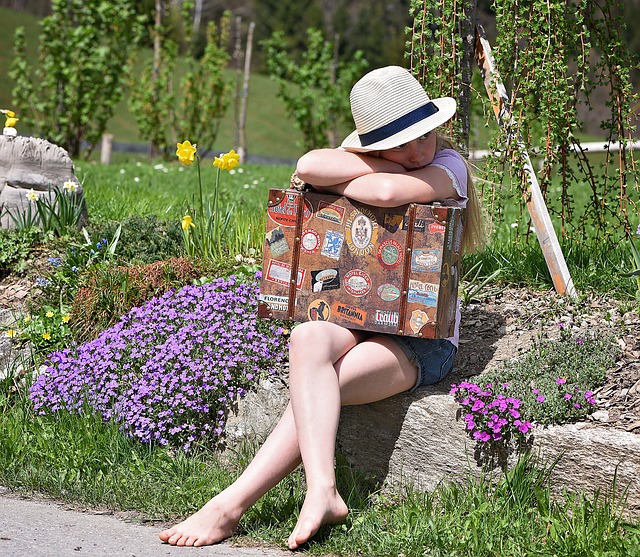
Are We Afraid To Go Barefoot Through Life?
Are We Afraid to Go Barefoot Through Life?
As I thought about this today I couldn’t help but compare the experience of walking barefoot in the grass and the mud to our lives. We have allowed our fears and our worries to cover up our spiritual feet – those sensitive parts of our body that help us find balance and alignment, that strengthen our spiritual muscles and develop our brains.
One of our scriptures for Sunday included the story of Jesus sending out the 72 disciples ahead of him into every town and place he intended to go to and he tells them:
“I am sending you out armed with vulnerability, like lambs walking into a pack of wolves. Don’t bring a wallet. Don’t carry a backpack. I don’t even want you to wear sandals. Walk along barefoot, quietly, without stopping for small talk.” (Luke 10:3,4 The Voice).
Wow! BAREFOOT! ARMED WITH VULNERABILITY!
Walking more in the way that children walk not weighed down by the prejudices and misconceptions that bind us.
I wonder was Jesus trying to toughen up his disciples here, helping them find their balance and make them less sensitive to slights and hurts and jagged rocks underfoot. Was he trying to strengthen their muscles and develop new neurological pathways that would grow their brains and help them understand the new perspectives he was teaching them?
Then I wonder: Have we lost some of our spiritual strength and balance because we are afraid to go barefoot, armed only with vulnerability? Are we more prone to the spiritual equivalent of germs and jagged rocks and prickles as a result? Are we hypersensitive not so much to the toxic pain of what is wrong with our society but to the bumps and lumps that toughen us up to enjoy what is good and healthy spiritual living?
I wish I had thought of writing about the benefits of walking barefoot and the delight of this childhood joy before I wrote The Gift of Wonder. There is a carefreeness to barefoot living that we seem to have lost just as we have lost so many other aspects of childhood.
Introduce A Little Barefoot Living
Here is some advice about barefoot living that I think is helpful as we consider how to apply it to our spiritual lives: (adapted from this article)
- Start slow. You need to be patient and start with short 15- to 20-minute sessions of walking barefoot this allows your feet and ankles to adapt. The spiritual toughening up process needs to be eased into too as any child starting their summer vacation cold tell you. “for the joy that is set before you take time to endure the pain” It is well worth it!
- Ease up if you feel any new pain or discomfort. Because our muscles have lost their strength we are at increased risk of injury. “Without appropriate strength in the foot, you are at risk of having poor mechanics of walking, thereby increasing your risk for injury.” I think that many of us have lost the mechanics of good spiritual walking too because we have not strengthened our muscles. Maybe some of the fallout we see in our churches is because we have not taught followers of Jesus to strengthen their muscles so they can walk well without injury.
- Practice on safe surfaces. “Once you’ve mastered the indoors, try walking on outside surfaces that are less dangerous, such as turf, rubber tracks, sandy beaches, and grass.” Once we have mastered barefoot living inside at home we could try it out in places we feel spiritually safe like discipleship groups before we take it outside into the neighbourhood.
- Experiment with balance exercises. “Start with simple balance exercises like standing on one foot or pressing yourself up onto your toes and lowering down slowly.” To me this speaks of the need to balance contemplation and action. Learning to rest the moment without stress and anxiety then committing ourselves to active involvement in God’s world is a good way to practice this.
- Try an activity that requires you to be barefoot. “Take advantage of activities that are already performed barefoot, like yoga, Pilates, or martial arts”. Now that one is easy for me – exercise the muscles of joy and delight that God has given you. Go for a barefoot awe and wonder walk, swim in the waves or play in a mud puddle. The delight of these types of practices strengthens us for a life of joy and delight in which the pressures of jagged rocks don’t bother us.
- Examine your feet for injury.”Every day examine the bottom of your feet for injury.” A good exercise to end your day with during this “toughening up period of barefoot living” is to ask yourself “What has caused me discomfort” before you go to bed. Identifying the sensitivities that cause pain allows God to bring healing to these areas so that you are really able to walk barefoot and carefree.
So get out there and enjoy a bit of barefoot living this week!
By Lilly Lewin
What does God’s love look like? When you think of God’s love, what comes to mind?
Maybe Sunsets, a bank of beautiful clouds, the ocean, children laughing, your best friend’s smile, your family, or maybe your puppy or cat welcoming you home? What do you think of when you think of the Love of God? What are the feelings and emotions that arise? Have you ever taken the time to consider what God’s love really looks like to you personally?
Sunsets represent God’s love to me! I am a visual learner so I love taking pictures with my phone. I love capturing the beauty of nature! Nature always reminds me of God’s love and faithfulness. 
What are the visual reminders that God loves you? What does God’s love look like to you?
Take some time this weekend to consider what God’s love looks like. You can get your whole family involved. You can use your phones to capture photos of what God’s love looks like, or you can draw pictures, or create a collage of pictures that represent God’s love to you. Take time to share them with your roommate, your friends, or family. You might even text them to a friend as reminder of how much God loves them. 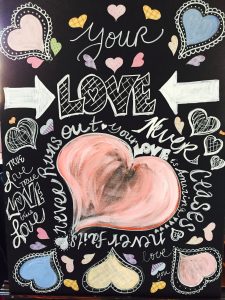
I am curating a Sacred Space prayer room next week in Kansas City and one of the prayer stations involves a Viso Divina reflection on photos of “What God’s Love looks like….” Participants will sit down and watch a slide show of various photos of what God’s Love Looks Like and consider God’s great love for each of them. I am still looking for images for the slide show so if you’d like to play along I’d love you to send me a pic to freerangeworship@gmail.com and you can tag it on instagram too! #GodslovelookslikeYouth2019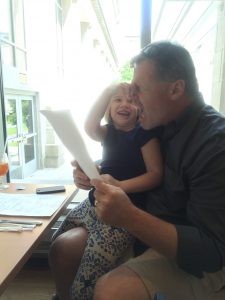
Any age can play! Ask your friends, kids, parents, grandparents! I’d love to see what God’s love looks like to you! Just know that as the curator, I will have the final decision on what works for our theme & audience.
Even if you don’t send in a selection, for your own spritual practice, pause, breathe and absorb God’s great love for you and spend some time in wonder of all the amazing ways God’s love is exhibited in your world! 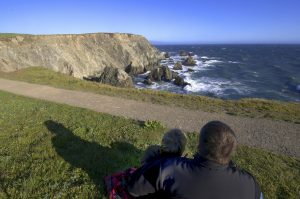
©lillylewin and freerangeworship.com The photos above all represent God’s love to me. the last photo is of my husband and me at Goat Rock on the Sonoma Coast in California. It was taken by my good friend DG Hollums.
by Christine Sine
So Christ has truly set us free. Now make sure that you stay free, and don’t get tied up again in slavery to the law.
For you have been called to live in freedom, my brothers and sisters. But don’t use your freedom to satisfy your sinful nature. Instead, use your freedom to serve one another in love. For the whole law can be summed up in this one command: “Love your neighbor as yourself.”But if you are always biting and devouring one another, watch out! Beware of destroying one another. Galatians 5:1, 13-15 NLT
The prayer above is one that I like to repost each year as I struggle with what it means to be free and the lack of freedom that so many in our society experience.
What Does It Mean to Be Free?
What does it mean to be free? Today is Independence Day in the U.S. when Americans celebrate their “freedom”. To be honest it is a celebration I struggle with because I don’t believe God calls us to be independent but rather interdependent. I also realize that our cultural perspectives shape our views of freedom but what I do believe is that Independence Day is a great time to reflect on our freedoms, what we appreciate and how we can extend those freedoms to others.
To Americans the concept of freedom focuses on the freedom of individual choice, which can be as trivial as the right to choose whether I want my eggs sunny side up or over easy, or as serious as the right to bear arms. What I struggle with is that there seems to be little recognition of the often dire consequences our individual choices can have for the society or for the world in which we live.
To Australians freedom revolves around the freedom of society and the recognition that our decisions all have consequences not just for us as individuals but for all of our society and our world. Consequently most Australians are willing to give up the right to bear arms for the good of a safe society in which we don’t have to worry about mass gun violence and killings. In the Australian political system voting is compulsory because of the belief that with the freedom of citizenship comes the responsibility of participation in the process that provides our freedom.
Unfortunately neither country does very well when it comes to granting freedom to all. We like to be exclusive – no freedom to immigrants, to those of other sexual orientation, those with disabilities, those of other races or religions. Whether we think of freedom as individual or societal we all like to limit who we give freedom to.
All of this leads me to my most important question about freedom “What does freedom look like in the kingdom of God?” Obviously there is a element of individual freedom – all of us need to take on the individual responsibility to kneel at the foot of the Cross, repent and reach out for the salvation of Christ. However our entry into the family of God faces us with serious consequences for how we act in society.
Our freedom as Christians means that we no longer focus on our own needs but rather “consider the needs of others as more important than our own” (Philippians 2) It means that we live by the law of love – what James calls “the royal law” (James 2:8). In the quote above, Paul sums this up very well “Do not use your freedom to indulge the sinful nature; rather serve one another humbly in love. For the entire law is fulfilled in keeping this one command: Love your neighbour as yourself.”
What is Your Response?
What comes to mind when you think about freedom? Take out your journal and piece of paper and divide it into 2 columns. On one side write the words that come to mind when you think of freedom. In the other column write down the negative consequences of your personal freedoms for others, for the earth and even for your life. Listen to the video below and reflect on the true meaning of freedom.
Sit quietly for a few minutes reflecting on your lists and the video you have listened to. Allow God to speak to you. Are there changes you need to make to your original lists based on your reflections? Are there places in which God calls you to repent of your “independence”? Are there ways in which God may ask you to give up your personal freedoms for the common good?
As an Amazon Associate, I receive a small amount for purchases made through appropriate links.
Thank you for supporting Godspace in this way.
When referencing or quoting Godspace Light, please be sure to include the Author (Christine Sine unless otherwise noted), the Title of the article or resource, the Source link where appropriate, and ©Godspacelight.com. Thank you!

